Unit 4 Don't eat in class. 单元综合复习课件 人教版英语七年级下册
文档属性
| 名称 | Unit 4 Don't eat in class. 单元综合复习课件 人教版英语七年级下册 |

|
|
| 格式 | pptx | ||
| 文件大小 | 39.7MB | ||
| 资源类型 | 试卷 | ||
| 版本资源 | 人教新目标(Go for it)版 | ||
| 科目 | 英语 | ||
| 更新时间 | 2024-03-26 09:42:51 | ||
图片预览



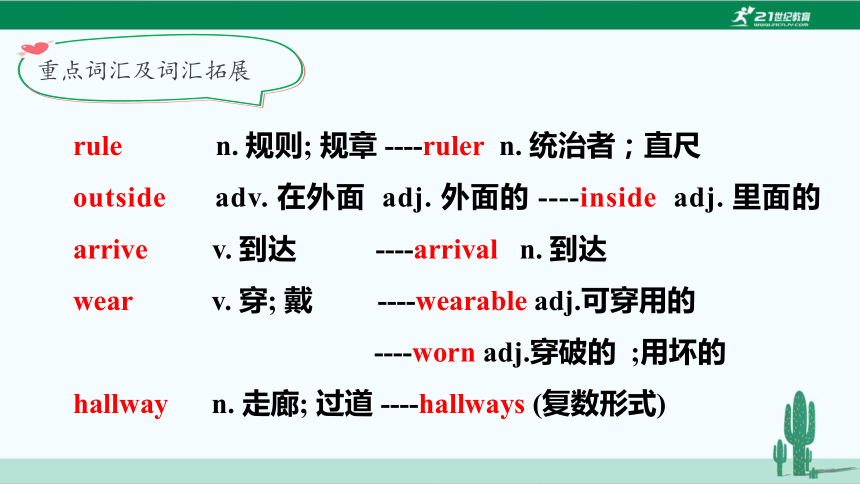
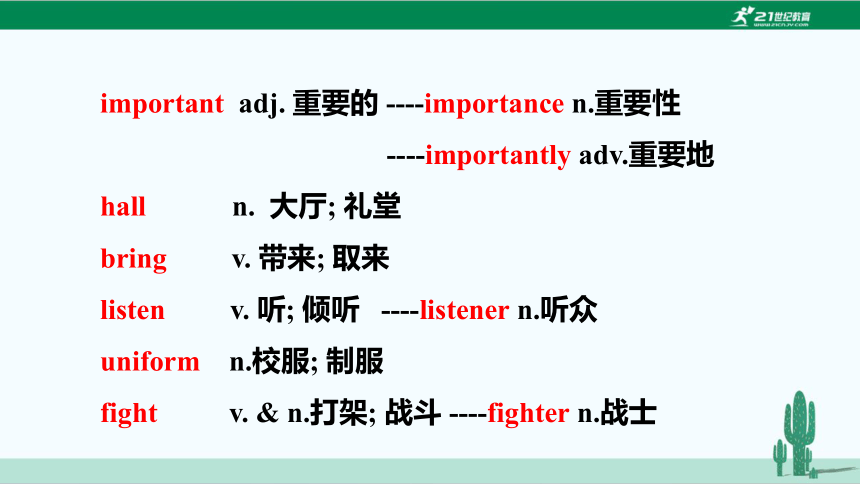
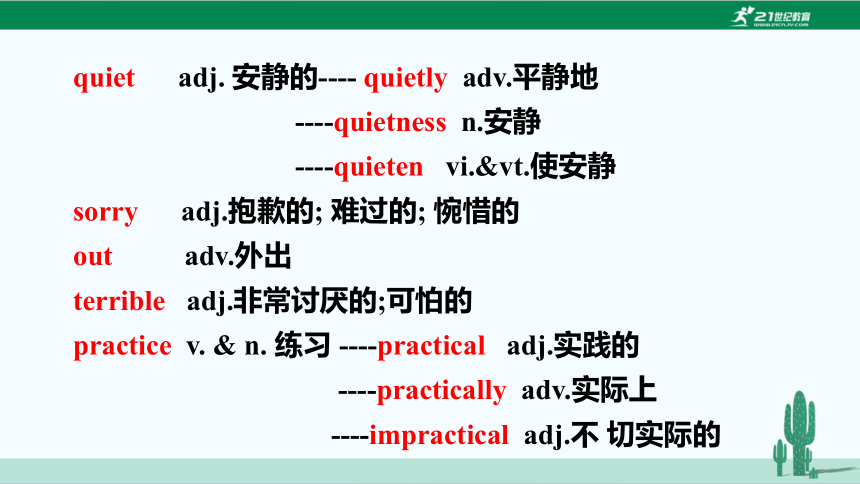
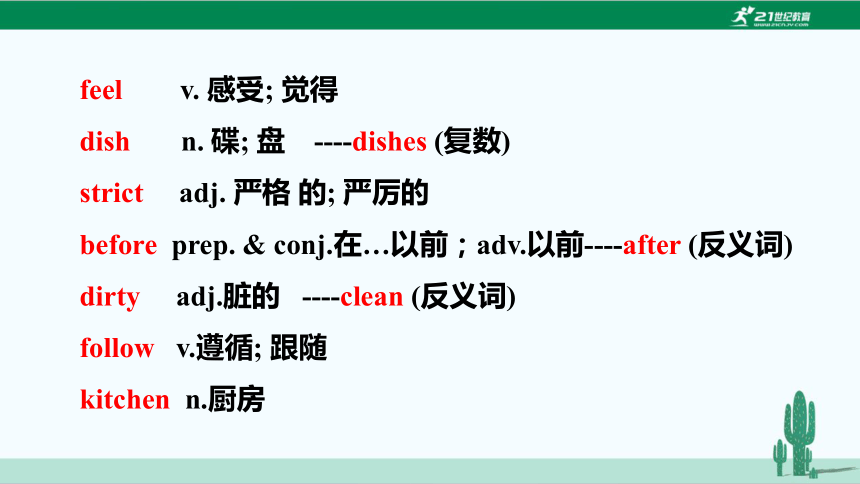

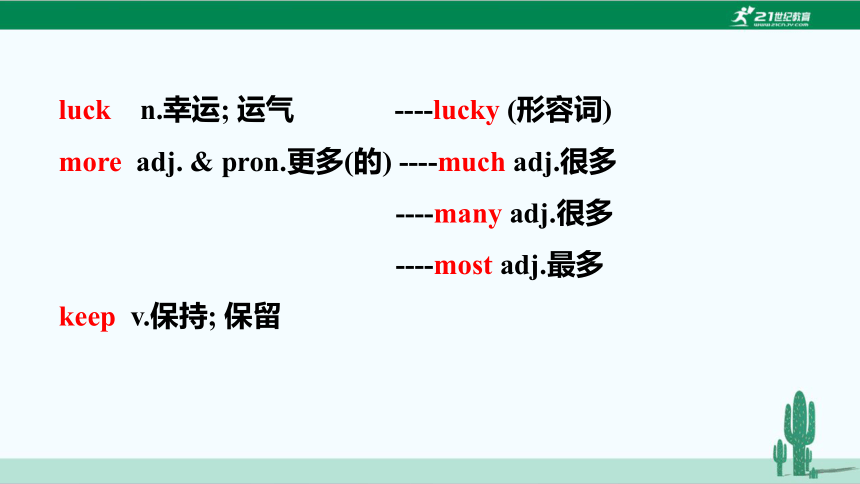
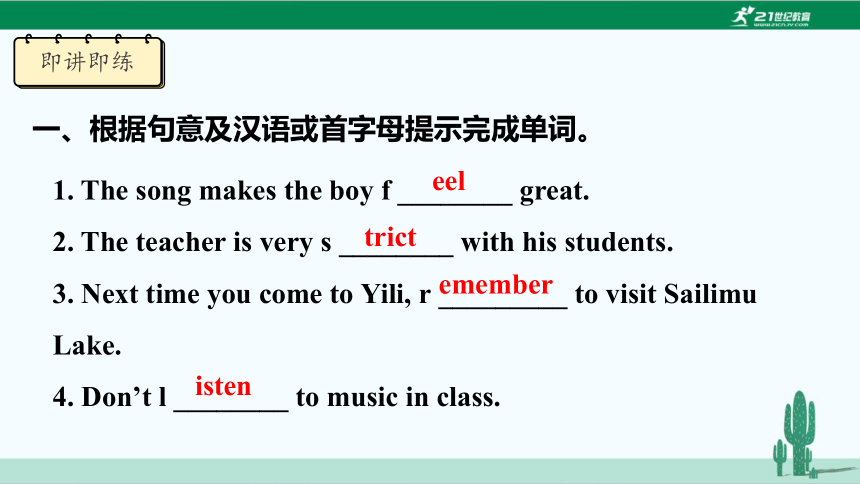
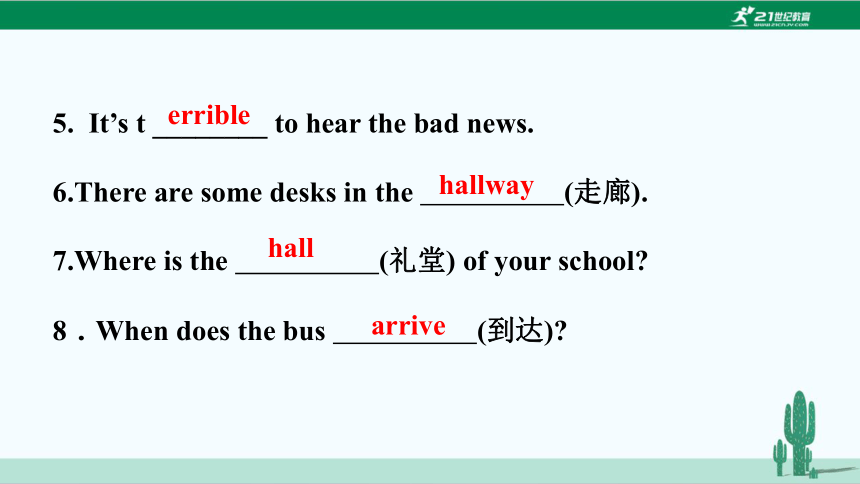
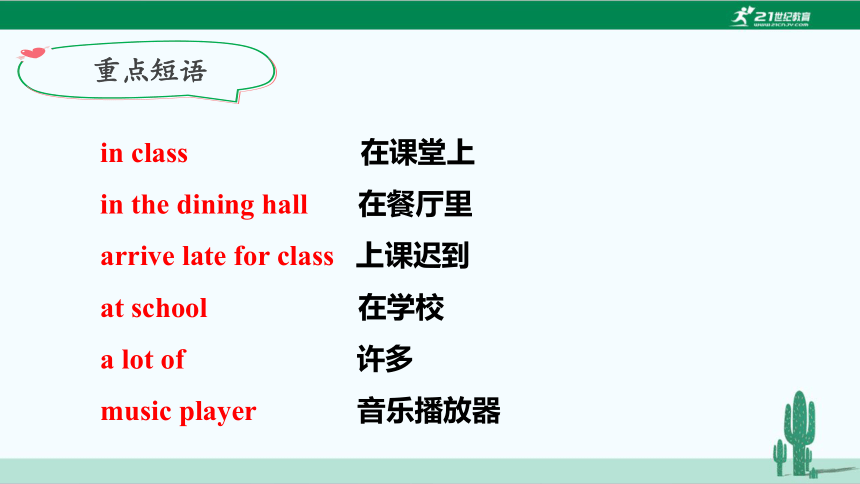
文档简介
(共71张PPT)
Unit 4 单元综合复习
人教版七年级下册
Content
词汇、短语回顾
01
重点句子回顾
02
重点词句精讲
03
语法知识精讲
04
单元话题写作
05
能力提升训练
06
目录
词汇、短语回顾
rule n. 规则; 规章 ----ruler n. 统治者;直尺
outside adv. 在外面 adj. 外面的 ----inside adj. 里面的arrive v. 到达 ----arrival n. 到达
wear v. 穿; 戴 ----wearable adj.可穿用的
----worn adj.穿破的 ;用坏的
hallway n. 走廊; 过道 ----hallways (复数形式)
重点词汇及词汇拓展
important adj. 重要的 ----importance n.重要性
----importantly adv.重要地
hall n. 大厅; 礼堂
bring v. 带来; 取来
listen v. 听; 倾听 ----listener n.听众
uniform n.校服; 制服
fight v. & n.打架; 战斗 ----fighter n.战士
quiet adj. 安静的---- quietly adv.平静地
----quietness n.安静
----quieten vi.&vt.使安静
sorry adj.抱歉的; 难过的; 惋惜的
out adv.外出
terrible adj.非常讨厌的;可怕的
practice v. & n. 练习 ----practical adj.实践的
----practically adv.实际上
----impractical adj.不 切实际的
feel v. 感受; 觉得
dish n. 碟; 盘 ----dishes (复数)
strict adj. 严格 的; 严厉的
before prep. & conj.在…以前;adv.以前----after (反义词)
dirty adj.脏的 ----clean (反义词)
follow v.遵循; 跟随
kitchen n.厨房
remember v. 记住; 记起----forget (反义词)
read v. 读; 阅读----reader n.读者----reading n.阅读
noisy adj. 吵闹的 ----noise n.噪音----noisily adv.嘈杂地
hair n. 头发; 毛发
relax v. 放松; 休息 ----relaxing adj.轻松的
----relaxed adj.感到放松的----relaxation n. 放松
learn v. 学习; 学会
luck n.幸运; 运气 ----lucky (形容词)
more adj. & pron.更多(的) ----much adj.很多
----many adj.很多
----most adj.最多
keep v.保持; 保留
一、根据句意及汉语或首字母提示完成单词。
即讲即练
1. The song makes the boy f ________ great.
2. The teacher is very s ________ with his students.
3. Next time you come to Yili, r _________ to visit Sailimu Lake.
4. Don’t l ________ to music in class.
eel
trict
emember
isten
5. It’s t ________ to hear the bad news.
6.There are some desks in the (走廊).
7.Where is the (礼堂) of your school
8.When does the bus (到达)
hallway
hall
arrive
errible
in class 在课堂上
in the dining hall 在餐厅里
arrive late for class 上课迟到
at school 在学校
a lot of 许多
music player 音乐播放器
重点短语
in the hallways 在走廊里
bring…to school 把…带到学校来
listen to 听
have to 必须; 不得不
be late 迟到
(be) on time 准时
too many 太多的
go out 外出(娱乐)
on school nights 在上学期间的晚上
practice the guitar 练习吉他
do the dishes. 清洗餐具
make breakfast 做早饭
make one's bed 铺床
read a book 看书
think about 考虑
be strict (with sb.) (对某人)要求严格
follow the rules 遵守规则
good luck 祝好运
即讲即练
一、根据汉语提示完成句子。
1. 我必须准时到校吗
________ I arrive at school ________ ________
2. 你在学校必须穿校服吗
Do you have to ________ the ________ ________ at school
3. 不要每天吃汉堡包。
Don’t ________ __________ every day.
Must
on
time
school
wear
uniform
eat
hamburgers
4. 我通常在学校餐厅吃午餐。
I usually have lunch in the _______ _______ _______.
5. 请把你的音乐播放器带给我。
Please _______ your music player _______ me.
school
dining
hall
bring
to
6. 我们可以在食堂吃东西,但不可以在教室吃。
We can eat in the _______ _______ , but we can’t eat _______
_______ _________ .
7. 请勿在走廊上追逐也不要上课迟到。
Don’t run _______ _______ _________ and don’t _______
late for class.
dining
hall
in
the
classroom
in
the
hallways
be
重点句子回顾
1.Don't arrive late for class. You must be on time. 不准上课迟到,务必守时。
2.It's my first day at school. 这是我在学校的第一天。
3.Don't listen to music in class. 不准在课堂上听音乐。
4.— Can we bring music players to school 我们可以带音乐播放器到学校吗?
—No, we can't. And we always have to wear the school uniform.
不行,而且我们总是要穿着校服。
5.Oh, and we also have to be quiet in the library.哦,而且我们还必须在图书馆里保持安静。
6.— Can we listen to music, Cindy 辛迪,我们可以听音乐吗?
— We can't listen to music in the hallways, but we can listen to it outside.我们不可以在走廊里听音乐,但在外面可以听。
7.—Does he have to wear a uniform at school 他在学校一定要穿校服吗?
—Yes, he does. / No, he doesn't. 是的, 必须要穿校服。不, 没必要。
8.Get up now and make your bed! 现在起床并整理你的床铺!
9.I must read a book before I can watch TV. 我必须先读一本书才能看电视。
10.I know how you feel. 我知道你的感受。
11.We have to follow them. 我们不得不遵守它们。
12.Don't leave the dirty dishes in the kitchen! 别把脏碗留在厨房里!
13.After dinner, I can't relax either. 晚饭后我也不能放松。
14.I have to go to bed before 10:00. 十点前我必须上床睡觉。
15.They make rules to help us. 他们制订规则帮助我们。
重点词句精讲
1. arrive的用法
arrive为不及物动词,其后跟地点名词时,则要加介词,若跟表示地点的副词here,there,home,abroad等时,不需要加任何介词。
arrive in +大地点(国家、大城市等)
arrive at+小地点(镇、家、店等)
He arrived in Jinan yesterday. 他昨天就到济南了。
I arrived at the restaurant an hour ago. 我一个小时前到达了这家餐馆。
I arrive home at 5 o'clock in the afternoon every day. 我每天下午5点钟到家。
【拓展】get与reach
get+地点的副词(here, there,home等)
get to十地点名词(school等)
reach+地点名词
When do you get to school 你什么时候到学校?
How do you get there 你怎么去那里?
They reached London last night. 他们非晚到达了伦敦。
2、 be late for
be late for 表示“……迟到”
arrive late for 也表示“……迟到”
arrive late for侧重到达的时间晚,be late for侧重状态。
eg:Don't arrive late for the class next time. 下次上课别迟到了。
=Don't be late for the class next time.
He is often late for school. 他经常上学迟到。
3、 listen与hear
listen为不及物动词,意为“听;倾听”,侧重听的动作。后接名词或代词作宾语时,须加介词to。
hear意为“听;倾听”,侧重听的“结果”。
Listen! Someone is singing in the next room. 听!有人正在隔壁房间唱歌。
Don't listen to music in class. 不准在课堂上听音乐。
Please listen to me. 请听我说。
Do you hear anything 你听到什么了吗?
4、 fight的用法
作名词,意为“打架;战斗”。
I don't want to have a fight with anyone. 我不想和任何人打架。
作动词,意为“打架;战斗”。过去式和过去分词为fought,fought。fight against/with sb. /sth.“与……搏斗,打架,作战”;
fight about/over sth.“因为某事而争论,争夺”;
fight for sth.“争取获得或完成某事”
Don't fight. 不准打架。
Why do you fight with that boy? 你为什么和那个男孩儿打架?
Don’t fight about small things. 不要为琐事争吵。
5、outside的用法
outside由“out + side”构成
adj. 外部的,室外的,外面的;外表的
The outside parts of some fruits are not good to eat. 有些水果的外部不好吃。
The outside walls are damp. 外墙潮湿。
prep. 向……外面,在……外面。
You can park your car outside our house . 你可以把车停在我们家外面。
adv. 在外面。外面地,向外面
反义词inside 在室内,在里面
Listen to music outside. 在外面听音乐
Go outside and see if it's raining. 去外边看看是否在下雨。
【拓展】
out of 表示“从……里面岀来”,是介词短语
Don't look out of the window. 别往窗外看。
7、important的用法
important adj. 重要的
importance n. 重要性;重大
It’s important (for sb.) to do sth. 做某事(对某人来说)是重要的
There is an important meeting this afternoon. 今天下午有一个重要的会议。
It’s important for us to learn English well. 对我们来说学好英语是重要的。
We all realized the importance of learning English. 我们都意识到学习英语的重要性。
8.bring与take
bring v. 带来;取来 take v. 拿走
bring表示运动轨迹由远及近。take表示运动轨迹由近及远,也表示随身携带。
bring sth. /sb. to…把某物/某人带到 反义词为
Can we bring music players to school 我们可以带音乐播放器到学校吗?
Next time don't forget to bring me a book. 下次不要忘了带一本书给我。
It's raining outside, please take an umbrella. 外面正在下雨,请带一把伞。
Take the umbrella with you. 你随身带把伞。
9.quiet的用法
quiet 作形容词,意为“安静的”,通常在句中作定语或表语。
quite 作副词,意为“很,非常”,注意quiet与quite两个单词的拼写。
Oh, and we also have to be quiet in the library.哦,而且我们还必须在图书馆里保 持安静。
Please be quiet.请保持安静。
The streets are usually quiet at night. 晚上街上通常很安静。
10.have to与must的用法
must 与 have to 的强调重点不同两者都表示“必须”,但 must 侧重于说话者的主观看法,认为有必要或有义务去做某事;have to则重于客观需要,含有“不得 不”或“被迫”之意。
We must go at once. 我们必须马上就走。
If I buy that car, I’ll have to borrow some money. 如果我要买那辆汽车, 我得借些钱。
must 与 have to 的时态形式不同,must 只有现在时一种形式(在宾语从句中可以表示过去),而 have to则有多种时态形式。
He said (that) she must go with me. 他说她必须同我一起去。
She had to go there on foot yesterday. 昨天她不得不步行去那儿。
must 与 have to 在否定式中意义不同,must 的否定式mustn’t 意为“一定不要”、“不允许”;而have to的否定式don’t have to意为“不必”(=needn’t)。
eg:You mustn’t tell him about it.你一定不要告诉他这件事。(这可能是秘密)
You needn’t tell him about it.你不必告诉他这件事。(他可能知道了)
11.practice的用法
vt. 练习 practice+名词/代词/动词-ing形式
I'm going to practice basketball every day. 我打算每天练习篮球。
You need to practice speaking English every day. 你需要每天练习说英语。
n. 练习;实践
Playing the guitar needs a lot of practice. 弹吉他需要多加练习。
Practice makes perfect. 熟能生巧。
12.dish的用法
dish作可数名词,意味“碟;盘”,常用复数形式。
do the dishes 清洗餐具=wash the dishes
dish还可用作可数名词,意味“菜肴;一道菜”
Mike pushed her plate away. 迈克把她的盘子推开了。
My mother’s job is do the dishes. 我妈妈的工作是洗碗。
He likes cold dishes. 他喜欢凉菜。
13.make与do的用法
make意为“生产;制造”,指用原材料制作成某种东西,或经过努力而做成某物。
make the/one’s bed 整理床铺;make dumplings 包饺子;make a noise制造噪音;make friends 交朋友;make rules制定规则
do作实义动词,意为“做”;指进行一项经常性的或指定的活动,一般强调做的动作。
do one’s homework 做家庭作业;do sports 做运动;do morning exercise做早操。
14.go out用法
外出(娱乐)
I must go out shopping for half an hour.我得外出半小时买东西。
熄灭
The match went out in the wind.火柴被风吹熄了。
过时;不再流行
Short skirts went out last year.短裙去年就过时了。
15. before
prep. 在……之前
He arrived before me.他在我之前到达。
conj. 在……之前
The children are advised to get home before dark.大家劝孩子们天黑以前要回家。
adv. 以前
I have met him before.我以前见过他。
16. strict
adj.严格的;严厉的
★She's on a very strict diet.她正严格节食。
be strict with sb.对某人要求严格
★She's very strict with her children.她待子女很严。
be strict about sth.对某事要求严格
★She's very strict about things like homework.她对作业非常严格。
17. remember v.记住;记起
remember to do sth.记得要做某事
★This afternoon we're going to have an Engish
class;remember to bring your book
今天下午我们将要上英语课,记得带你的书来。
remember doing sth.记得做过某事
★I remember seeing her somewhere.我记得以前在哪儿见过她。
18. follow v. 遵循;遵守;跟随
We should follow the rules at school.我们应该遵守学校的规定。
The children followed their mother into the room.孩子们跟着母亲进了房间。
19. keep v. 保持;保留
He always keeps his room in order.他经常保持房间整齐。
keep up with跟上;不落后;赶上 keep doing sth.继续/重复做某事
Don't run, I can't keep up with you.别跑了,我赶不上你了。
The child kept crying.那孩子哭个不停。
语法知识精讲
一、祈使句定义
祈使句通常以动词原形开头,用于表达命令、请求、劝告、警告和禁止等的句子称为祈使句。否定式在动词原形前面加don't。其主语是第二人称,所以通常省略主语,句末使用感叹号或者句号。
Go and wash your hands!快去洗手!(命令)
Be quite, please! 请安静!(请求)
Be kind to the children.善待孩子们。(劝告)
Watch your steps!小心脚下!(警告)
No photos!禁止拍照! No Smoking!禁止吸烟!(禁止)
祈使句的用法
祈使句的类型
类型 例子
DO型:动词原形+(宾语)+其他 Please write down your name.请写下你的名字。Open the window,please.请打开窗户。
Be型:Be+表语+其他成分 Be a good girl!做一个好孩子!
Be quick!快一点!
Let型:Let+宾语+动词原形+其他 Let me help you!我来帮你吧!
Let's clean the classroom!(Let's=Let us)让我们来打扫教室!
祈使句的否定
类型 例子
DO型:Don t+动词原形+(宾语)+其他 Please don t write down your name.请不要写下你的名字。
Don t open the window,please.请不要打开窗户。
Be型:Don t+Be+表语+其他成分 Don t be a good girl!别做个好女孩!
Don t be quick!别这么快!
Let型: Don t+Let+宾语+动词原形+其他 Don t Let me help you!别让我帮你!
Let's not clean the classroom!我们不打扫教室!
Let+宾语+not+动词原形+(其他)。 一些特殊的祈使句:
1、No+名词的复数或动词-ing形式(即动名词)也作为祈使句,这种类型的祈使句常用作标志语或说明,意为“严禁(不准、禁止)做某事”。
eg:No smoking. 不准吸烟。 No photos. 不准拍照。
2、也可以用名词(动名词)、形容词、副词、动词等直接表达。这种祈使句简洁明了,具有鲜明的口语特色。
eg:Hands up!举起手来! Help!救命啊! Off the grass! 勿踏草坪!
对祈使句的回答
对祈使句作答时,常会用will和won't、
-Close the door, please. 请关门
-Certainly/Sure/OK/Yes/of course, I will. 当然,我会的。
-Don't be late for school, Jim! 吉姆,上学别迟到!
-No,I won't. 不,我不会(迟到的)。
( )1. listen to music in the classroom.
A. Not B. No
C. Don’t D. Do
( )2.— the dishes after dinner, Tony.
— No problem, Mom.
A. Washing B. Washes C. To wash D. Wash
一、单项选择。
即讲即练
C
D
( )3.Let’s on time for class.
A. be B. is
C. are D. am
( )4. Sorry, you play basketball in the classroom.
A. can’t B. don’t
C. don’t have to D. doesn’t
A
A
1. (do) the homework before going to bed.
2.Please (be) quiet in class. Our teacher is teaching.
3. (not let) the cat go out.
二、用括号内所给单词的适当形式填空。
Do
be
Don’t let
4.No (swim) here. It’s dangerous.
5.They have to (take) the bus to school.
6.We have a lot of (rule) in our school.
swimming
take
rules
单元话题写作
单元话题写作
单元写作目标
此单元的写作话题是“规章制度”。没有规矩不成方圆。无论是班级、学校,还是其他公共场所,都有各自的规章制度。现在,就让我们结合写作实例一起学习一下如何描述“规章制度”吧。
素材积累
相关词汇:
1.重要的 important 2.校服;制服 uniform
3.安静的 quiet 4.保持;保留 keep
5.吵闹的 noisy 6.遵循;跟随follow
7.准时 (be)on time 8.遵守规则 follow the rules
9.考虑 think about
相关句型:
开头句
1.Our school rules are strict but helpful.
2.Now let me tell you something about my family rules.
中间句
1.Don’t go out with friends on school nights.
2.Don‘t arrive late for class.
结尾句
1.I think it’s best to follow the rules.
2.What about your school rules
范例
请根据下面的提示,介绍一下你们班的班规,并说一说你对这些班规的看法。
提示:1.Can you arrive late for class
2.What can’t you do in class
3.What is your idea about these rules
要求: 60-70词。
审题:
1.文体:记叙文
2.时态:一般现在时
3.人称:第一人称
要点提取:规则及规则的重要性。
We have lots of rules in our class. Now let me tell you something about them.
First of all, we can’t arrive late for class. It’s very important for students to be on time. Then, we can’t talk loudly in class because it can show our respect to our teachers. What’s more, we shouldn’t eat or drink in class. At the same time, we can’t play games or listen to music in class.
All in all, some of the rules are too strict. But I think these rules are good for us and they can help us.
能力提升训练
一、阅读下面短文,在空白处填入一个适当的单词 (有提示词的,填入所给单词的正确形式)。
Jim lives in Los Angeles. He is a ________ (noise) boy. He doesn’t like to follow the ________ (rule) at home and at school. He thinks they are terrible for him.
His parents are strict ________ him at home.He makes his bed in the morning. He ________ (have) to do the dishes after dinner. He can only watch TV for ________ hour every night. He can’t _____ (go) out with his friends.He must read a book on the weekend.He________ (arrive) at
noisy
rules
with
has
an
go
arrives
school on time and listens to the teachers in class. He must wear his uniform every day. He can’t run ________ fight in the hallways. He ________ (feel) sorry, so he wants to talk to his parents and teachers. But I think it’s important for ________(he) to keep quiet. Do you think so
or
feels
him
二、单项选择
( ) 32. This is a(n) _______ talk. Please arrive on time.
A. important B. quiet C. new D. clean
( ) 33. — Why is Mr. Green so _______ with his students
— Because he wants them to do well in math.
A. strict B. sorry C. terrible D. afraid
( ) 34. Tom, please don’t be _______ . I want to do my homework now.
A. boring B. busy C. noisy D. difficult
A
A
C
( ) 35. Lisa doesn’t have a bike. So she _______ walk to school.
A. has to B. doesn’t C. can D. can’t
( ) 36. — I hear you must do the dishes after dinner every day.
— Right. It’s one of the _______ of my family.
A. plans B. jobs C. shows D. rules
( ) 37. I _______ you, Tina. We are in the same class in Grade
A. teach B. remember C. find D. relax
A
D
B
三、书面表达
假如你是王刚,你的美国笔友迈克给你发来电子邮件询问你们学校在暑假期间对学生的要求。请你根据以下要点给他回一封电子邮件。50词左右,可适当发挥。电子邮件的开头和结尾已给出,不计入总词数。
要点:按时完成作业;不打架;不去河里游泳;不在马路上玩耍
提示词:dangerous 危险的; road 马路
Dear Mike,
You ask me about the rules we have to follow during the summer vacation. Now let me tell you some ofthem.____________________
Yours,
Wang Gang
Dear Mike,
You ask me about the rules we have to follow during the summer vacation. Now let me tell you some of them.
First, we must finish our homework on time. I think this is very important. Second, we can’t fight with others. Next, we can’t swim in the river because it’s very dangerous. But we can go to the swimming pool. And we can’t play on the road because there are many cars.
Yours,
Wang Gang
谢谢
21世纪教育网(www.21cnjy.com)
中小学教育资源网站
兼职招聘:
https://www.21cnjy.com/recruitment/home/admin
Unit 4 单元综合复习
人教版七年级下册
Content
词汇、短语回顾
01
重点句子回顾
02
重点词句精讲
03
语法知识精讲
04
单元话题写作
05
能力提升训练
06
目录
词汇、短语回顾
rule n. 规则; 规章 ----ruler n. 统治者;直尺
outside adv. 在外面 adj. 外面的 ----inside adj. 里面的arrive v. 到达 ----arrival n. 到达
wear v. 穿; 戴 ----wearable adj.可穿用的
----worn adj.穿破的 ;用坏的
hallway n. 走廊; 过道 ----hallways (复数形式)
重点词汇及词汇拓展
important adj. 重要的 ----importance n.重要性
----importantly adv.重要地
hall n. 大厅; 礼堂
bring v. 带来; 取来
listen v. 听; 倾听 ----listener n.听众
uniform n.校服; 制服
fight v. & n.打架; 战斗 ----fighter n.战士
quiet adj. 安静的---- quietly adv.平静地
----quietness n.安静
----quieten vi.&vt.使安静
sorry adj.抱歉的; 难过的; 惋惜的
out adv.外出
terrible adj.非常讨厌的;可怕的
practice v. & n. 练习 ----practical adj.实践的
----practically adv.实际上
----impractical adj.不 切实际的
feel v. 感受; 觉得
dish n. 碟; 盘 ----dishes (复数)
strict adj. 严格 的; 严厉的
before prep. & conj.在…以前;adv.以前----after (反义词)
dirty adj.脏的 ----clean (反义词)
follow v.遵循; 跟随
kitchen n.厨房
remember v. 记住; 记起----forget (反义词)
read v. 读; 阅读----reader n.读者----reading n.阅读
noisy adj. 吵闹的 ----noise n.噪音----noisily adv.嘈杂地
hair n. 头发; 毛发
relax v. 放松; 休息 ----relaxing adj.轻松的
----relaxed adj.感到放松的----relaxation n. 放松
learn v. 学习; 学会
luck n.幸运; 运气 ----lucky (形容词)
more adj. & pron.更多(的) ----much adj.很多
----many adj.很多
----most adj.最多
keep v.保持; 保留
一、根据句意及汉语或首字母提示完成单词。
即讲即练
1. The song makes the boy f ________ great.
2. The teacher is very s ________ with his students.
3. Next time you come to Yili, r _________ to visit Sailimu Lake.
4. Don’t l ________ to music in class.
eel
trict
emember
isten
5. It’s t ________ to hear the bad news.
6.There are some desks in the (走廊).
7.Where is the (礼堂) of your school
8.When does the bus (到达)
hallway
hall
arrive
errible
in class 在课堂上
in the dining hall 在餐厅里
arrive late for class 上课迟到
at school 在学校
a lot of 许多
music player 音乐播放器
重点短语
in the hallways 在走廊里
bring…to school 把…带到学校来
listen to 听
have to 必须; 不得不
be late 迟到
(be) on time 准时
too many 太多的
go out 外出(娱乐)
on school nights 在上学期间的晚上
practice the guitar 练习吉他
do the dishes. 清洗餐具
make breakfast 做早饭
make one's bed 铺床
read a book 看书
think about 考虑
be strict (with sb.) (对某人)要求严格
follow the rules 遵守规则
good luck 祝好运
即讲即练
一、根据汉语提示完成句子。
1. 我必须准时到校吗
________ I arrive at school ________ ________
2. 你在学校必须穿校服吗
Do you have to ________ the ________ ________ at school
3. 不要每天吃汉堡包。
Don’t ________ __________ every day.
Must
on
time
school
wear
uniform
eat
hamburgers
4. 我通常在学校餐厅吃午餐。
I usually have lunch in the _______ _______ _______.
5. 请把你的音乐播放器带给我。
Please _______ your music player _______ me.
school
dining
hall
bring
to
6. 我们可以在食堂吃东西,但不可以在教室吃。
We can eat in the _______ _______ , but we can’t eat _______
_______ _________ .
7. 请勿在走廊上追逐也不要上课迟到。
Don’t run _______ _______ _________ and don’t _______
late for class.
dining
hall
in
the
classroom
in
the
hallways
be
重点句子回顾
1.Don't arrive late for class. You must be on time. 不准上课迟到,务必守时。
2.It's my first day at school. 这是我在学校的第一天。
3.Don't listen to music in class. 不准在课堂上听音乐。
4.— Can we bring music players to school 我们可以带音乐播放器到学校吗?
—No, we can't. And we always have to wear the school uniform.
不行,而且我们总是要穿着校服。
5.Oh, and we also have to be quiet in the library.哦,而且我们还必须在图书馆里保持安静。
6.— Can we listen to music, Cindy 辛迪,我们可以听音乐吗?
— We can't listen to music in the hallways, but we can listen to it outside.我们不可以在走廊里听音乐,但在外面可以听。
7.—Does he have to wear a uniform at school 他在学校一定要穿校服吗?
—Yes, he does. / No, he doesn't. 是的, 必须要穿校服。不, 没必要。
8.Get up now and make your bed! 现在起床并整理你的床铺!
9.I must read a book before I can watch TV. 我必须先读一本书才能看电视。
10.I know how you feel. 我知道你的感受。
11.We have to follow them. 我们不得不遵守它们。
12.Don't leave the dirty dishes in the kitchen! 别把脏碗留在厨房里!
13.After dinner, I can't relax either. 晚饭后我也不能放松。
14.I have to go to bed before 10:00. 十点前我必须上床睡觉。
15.They make rules to help us. 他们制订规则帮助我们。
重点词句精讲
1. arrive的用法
arrive为不及物动词,其后跟地点名词时,则要加介词,若跟表示地点的副词here,there,home,abroad等时,不需要加任何介词。
arrive in +大地点(国家、大城市等)
arrive at+小地点(镇、家、店等)
He arrived in Jinan yesterday. 他昨天就到济南了。
I arrived at the restaurant an hour ago. 我一个小时前到达了这家餐馆。
I arrive home at 5 o'clock in the afternoon every day. 我每天下午5点钟到家。
【拓展】get与reach
get+地点的副词(here, there,home等)
get to十地点名词(school等)
reach+地点名词
When do you get to school 你什么时候到学校?
How do you get there 你怎么去那里?
They reached London last night. 他们非晚到达了伦敦。
2、 be late for
be late for 表示“……迟到”
arrive late for 也表示“……迟到”
arrive late for侧重到达的时间晚,be late for侧重状态。
eg:Don't arrive late for the class next time. 下次上课别迟到了。
=Don't be late for the class next time.
He is often late for school. 他经常上学迟到。
3、 listen与hear
listen为不及物动词,意为“听;倾听”,侧重听的动作。后接名词或代词作宾语时,须加介词to。
hear意为“听;倾听”,侧重听的“结果”。
Listen! Someone is singing in the next room. 听!有人正在隔壁房间唱歌。
Don't listen to music in class. 不准在课堂上听音乐。
Please listen to me. 请听我说。
Do you hear anything 你听到什么了吗?
4、 fight的用法
作名词,意为“打架;战斗”。
I don't want to have a fight with anyone. 我不想和任何人打架。
作动词,意为“打架;战斗”。过去式和过去分词为fought,fought。fight against/with sb. /sth.“与……搏斗,打架,作战”;
fight about/over sth.“因为某事而争论,争夺”;
fight for sth.“争取获得或完成某事”
Don't fight. 不准打架。
Why do you fight with that boy? 你为什么和那个男孩儿打架?
Don’t fight about small things. 不要为琐事争吵。
5、outside的用法
outside由“out + side”构成
adj. 外部的,室外的,外面的;外表的
The outside parts of some fruits are not good to eat. 有些水果的外部不好吃。
The outside walls are damp. 外墙潮湿。
prep. 向……外面,在……外面。
You can park your car outside our house . 你可以把车停在我们家外面。
adv. 在外面。外面地,向外面
反义词inside 在室内,在里面
Listen to music outside. 在外面听音乐
Go outside and see if it's raining. 去外边看看是否在下雨。
【拓展】
out of 表示“从……里面岀来”,是介词短语
Don't look out of the window. 别往窗外看。
7、important的用法
important adj. 重要的
importance n. 重要性;重大
It’s important (for sb.) to do sth. 做某事(对某人来说)是重要的
There is an important meeting this afternoon. 今天下午有一个重要的会议。
It’s important for us to learn English well. 对我们来说学好英语是重要的。
We all realized the importance of learning English. 我们都意识到学习英语的重要性。
8.bring与take
bring v. 带来;取来 take v. 拿走
bring表示运动轨迹由远及近。take表示运动轨迹由近及远,也表示随身携带。
bring sth. /sb. to…把某物/某人带到 反义词为
Can we bring music players to school 我们可以带音乐播放器到学校吗?
Next time don't forget to bring me a book. 下次不要忘了带一本书给我。
It's raining outside, please take an umbrella. 外面正在下雨,请带一把伞。
Take the umbrella with you. 你随身带把伞。
9.quiet的用法
quiet 作形容词,意为“安静的”,通常在句中作定语或表语。
quite 作副词,意为“很,非常”,注意quiet与quite两个单词的拼写。
Oh, and we also have to be quiet in the library.哦,而且我们还必须在图书馆里保 持安静。
Please be quiet.请保持安静。
The streets are usually quiet at night. 晚上街上通常很安静。
10.have to与must的用法
must 与 have to 的强调重点不同两者都表示“必须”,但 must 侧重于说话者的主观看法,认为有必要或有义务去做某事;have to则重于客观需要,含有“不得 不”或“被迫”之意。
We must go at once. 我们必须马上就走。
If I buy that car, I’ll have to borrow some money. 如果我要买那辆汽车, 我得借些钱。
must 与 have to 的时态形式不同,must 只有现在时一种形式(在宾语从句中可以表示过去),而 have to则有多种时态形式。
He said (that) she must go with me. 他说她必须同我一起去。
She had to go there on foot yesterday. 昨天她不得不步行去那儿。
must 与 have to 在否定式中意义不同,must 的否定式mustn’t 意为“一定不要”、“不允许”;而have to的否定式don’t have to意为“不必”(=needn’t)。
eg:You mustn’t tell him about it.你一定不要告诉他这件事。(这可能是秘密)
You needn’t tell him about it.你不必告诉他这件事。(他可能知道了)
11.practice的用法
vt. 练习 practice+名词/代词/动词-ing形式
I'm going to practice basketball every day. 我打算每天练习篮球。
You need to practice speaking English every day. 你需要每天练习说英语。
n. 练习;实践
Playing the guitar needs a lot of practice. 弹吉他需要多加练习。
Practice makes perfect. 熟能生巧。
12.dish的用法
dish作可数名词,意味“碟;盘”,常用复数形式。
do the dishes 清洗餐具=wash the dishes
dish还可用作可数名词,意味“菜肴;一道菜”
Mike pushed her plate away. 迈克把她的盘子推开了。
My mother’s job is do the dishes. 我妈妈的工作是洗碗。
He likes cold dishes. 他喜欢凉菜。
13.make与do的用法
make意为“生产;制造”,指用原材料制作成某种东西,或经过努力而做成某物。
make the/one’s bed 整理床铺;make dumplings 包饺子;make a noise制造噪音;make friends 交朋友;make rules制定规则
do作实义动词,意为“做”;指进行一项经常性的或指定的活动,一般强调做的动作。
do one’s homework 做家庭作业;do sports 做运动;do morning exercise做早操。
14.go out用法
外出(娱乐)
I must go out shopping for half an hour.我得外出半小时买东西。
熄灭
The match went out in the wind.火柴被风吹熄了。
过时;不再流行
Short skirts went out last year.短裙去年就过时了。
15. before
prep. 在……之前
He arrived before me.他在我之前到达。
conj. 在……之前
The children are advised to get home before dark.大家劝孩子们天黑以前要回家。
adv. 以前
I have met him before.我以前见过他。
16. strict
adj.严格的;严厉的
★She's on a very strict diet.她正严格节食。
be strict with sb.对某人要求严格
★She's very strict with her children.她待子女很严。
be strict about sth.对某事要求严格
★She's very strict about things like homework.她对作业非常严格。
17. remember v.记住;记起
remember to do sth.记得要做某事
★This afternoon we're going to have an Engish
class;remember to bring your book
今天下午我们将要上英语课,记得带你的书来。
remember doing sth.记得做过某事
★I remember seeing her somewhere.我记得以前在哪儿见过她。
18. follow v. 遵循;遵守;跟随
We should follow the rules at school.我们应该遵守学校的规定。
The children followed their mother into the room.孩子们跟着母亲进了房间。
19. keep v. 保持;保留
He always keeps his room in order.他经常保持房间整齐。
keep up with跟上;不落后;赶上 keep doing sth.继续/重复做某事
Don't run, I can't keep up with you.别跑了,我赶不上你了。
The child kept crying.那孩子哭个不停。
语法知识精讲
一、祈使句定义
祈使句通常以动词原形开头,用于表达命令、请求、劝告、警告和禁止等的句子称为祈使句。否定式在动词原形前面加don't。其主语是第二人称,所以通常省略主语,句末使用感叹号或者句号。
Go and wash your hands!快去洗手!(命令)
Be quite, please! 请安静!(请求)
Be kind to the children.善待孩子们。(劝告)
Watch your steps!小心脚下!(警告)
No photos!禁止拍照! No Smoking!禁止吸烟!(禁止)
祈使句的用法
祈使句的类型
类型 例子
DO型:动词原形+(宾语)+其他 Please write down your name.请写下你的名字。Open the window,please.请打开窗户。
Be型:Be+表语+其他成分 Be a good girl!做一个好孩子!
Be quick!快一点!
Let型:Let+宾语+动词原形+其他 Let me help you!我来帮你吧!
Let's clean the classroom!(Let's=Let us)让我们来打扫教室!
祈使句的否定
类型 例子
DO型:Don t+动词原形+(宾语)+其他 Please don t write down your name.请不要写下你的名字。
Don t open the window,please.请不要打开窗户。
Be型:Don t+Be+表语+其他成分 Don t be a good girl!别做个好女孩!
Don t be quick!别这么快!
Let型: Don t+Let+宾语+动词原形+其他 Don t Let me help you!别让我帮你!
Let's not clean the classroom!我们不打扫教室!
Let+宾语+not+动词原形+(其他)。 一些特殊的祈使句:
1、No+名词的复数或动词-ing形式(即动名词)也作为祈使句,这种类型的祈使句常用作标志语或说明,意为“严禁(不准、禁止)做某事”。
eg:No smoking. 不准吸烟。 No photos. 不准拍照。
2、也可以用名词(动名词)、形容词、副词、动词等直接表达。这种祈使句简洁明了,具有鲜明的口语特色。
eg:Hands up!举起手来! Help!救命啊! Off the grass! 勿踏草坪!
对祈使句的回答
对祈使句作答时,常会用will和won't、
-Close the door, please. 请关门
-Certainly/Sure/OK/Yes/of course, I will. 当然,我会的。
-Don't be late for school, Jim! 吉姆,上学别迟到!
-No,I won't. 不,我不会(迟到的)。
( )1. listen to music in the classroom.
A. Not B. No
C. Don’t D. Do
( )2.— the dishes after dinner, Tony.
— No problem, Mom.
A. Washing B. Washes C. To wash D. Wash
一、单项选择。
即讲即练
C
D
( )3.Let’s on time for class.
A. be B. is
C. are D. am
( )4. Sorry, you play basketball in the classroom.
A. can’t B. don’t
C. don’t have to D. doesn’t
A
A
1. (do) the homework before going to bed.
2.Please (be) quiet in class. Our teacher is teaching.
3. (not let) the cat go out.
二、用括号内所给单词的适当形式填空。
Do
be
Don’t let
4.No (swim) here. It’s dangerous.
5.They have to (take) the bus to school.
6.We have a lot of (rule) in our school.
swimming
take
rules
单元话题写作
单元话题写作
单元写作目标
此单元的写作话题是“规章制度”。没有规矩不成方圆。无论是班级、学校,还是其他公共场所,都有各自的规章制度。现在,就让我们结合写作实例一起学习一下如何描述“规章制度”吧。
素材积累
相关词汇:
1.重要的 important 2.校服;制服 uniform
3.安静的 quiet 4.保持;保留 keep
5.吵闹的 noisy 6.遵循;跟随follow
7.准时 (be)on time 8.遵守规则 follow the rules
9.考虑 think about
相关句型:
开头句
1.Our school rules are strict but helpful.
2.Now let me tell you something about my family rules.
中间句
1.Don’t go out with friends on school nights.
2.Don‘t arrive late for class.
结尾句
1.I think it’s best to follow the rules.
2.What about your school rules
范例
请根据下面的提示,介绍一下你们班的班规,并说一说你对这些班规的看法。
提示:1.Can you arrive late for class
2.What can’t you do in class
3.What is your idea about these rules
要求: 60-70词。
审题:
1.文体:记叙文
2.时态:一般现在时
3.人称:第一人称
要点提取:规则及规则的重要性。
We have lots of rules in our class. Now let me tell you something about them.
First of all, we can’t arrive late for class. It’s very important for students to be on time. Then, we can’t talk loudly in class because it can show our respect to our teachers. What’s more, we shouldn’t eat or drink in class. At the same time, we can’t play games or listen to music in class.
All in all, some of the rules are too strict. But I think these rules are good for us and they can help us.
能力提升训练
一、阅读下面短文,在空白处填入一个适当的单词 (有提示词的,填入所给单词的正确形式)。
Jim lives in Los Angeles. He is a ________ (noise) boy. He doesn’t like to follow the ________ (rule) at home and at school. He thinks they are terrible for him.
His parents are strict ________ him at home.He makes his bed in the morning. He ________ (have) to do the dishes after dinner. He can only watch TV for ________ hour every night. He can’t _____ (go) out with his friends.He must read a book on the weekend.He________ (arrive) at
noisy
rules
with
has
an
go
arrives
school on time and listens to the teachers in class. He must wear his uniform every day. He can’t run ________ fight in the hallways. He ________ (feel) sorry, so he wants to talk to his parents and teachers. But I think it’s important for ________(he) to keep quiet. Do you think so
or
feels
him
二、单项选择
( ) 32. This is a(n) _______ talk. Please arrive on time.
A. important B. quiet C. new D. clean
( ) 33. — Why is Mr. Green so _______ with his students
— Because he wants them to do well in math.
A. strict B. sorry C. terrible D. afraid
( ) 34. Tom, please don’t be _______ . I want to do my homework now.
A. boring B. busy C. noisy D. difficult
A
A
C
( ) 35. Lisa doesn’t have a bike. So she _______ walk to school.
A. has to B. doesn’t C. can D. can’t
( ) 36. — I hear you must do the dishes after dinner every day.
— Right. It’s one of the _______ of my family.
A. plans B. jobs C. shows D. rules
( ) 37. I _______ you, Tina. We are in the same class in Grade
A. teach B. remember C. find D. relax
A
D
B
三、书面表达
假如你是王刚,你的美国笔友迈克给你发来电子邮件询问你们学校在暑假期间对学生的要求。请你根据以下要点给他回一封电子邮件。50词左右,可适当发挥。电子邮件的开头和结尾已给出,不计入总词数。
要点:按时完成作业;不打架;不去河里游泳;不在马路上玩耍
提示词:dangerous 危险的; road 马路
Dear Mike,
You ask me about the rules we have to follow during the summer vacation. Now let me tell you some ofthem.____________________
Yours,
Wang Gang
Dear Mike,
You ask me about the rules we have to follow during the summer vacation. Now let me tell you some of them.
First, we must finish our homework on time. I think this is very important. Second, we can’t fight with others. Next, we can’t swim in the river because it’s very dangerous. But we can go to the swimming pool. And we can’t play on the road because there are many cars.
Yours,
Wang Gang
谢谢
21世纪教育网(www.21cnjy.com)
中小学教育资源网站
兼职招聘:
https://www.21cnjy.com/recruitment/home/admin
同课章节目录
- Unit 1 Can you play the guitar?
- Section A
- Section B
- Unit 2 What time do you go to school?
- Section A
- Section B
- Unit 3 How do you get to school?
- Section A
- Section B
- Unit 4 Don't eat in class.
- Section A
- Section B
- Unit 5 Why do you like pandas?
- Section A
- Section B
- Unit 6 I'm watching TV.
- Section A
- Section B
- Review of Units 1-6
- Unit 7 It's raining!
- Section A
- Section B
- Unit 8 Is there a post office near here?
- Section A
- Section B
- Unit 9 What does he look like?
- Section A
- Section B
- Unit 10 I'd like some noodles.
- Section A
- Section B
- Unit 11 How was your school trip?
- Section A
- Section B
- Unit 12 What did you do last weekend?
- Section A
- Section B
